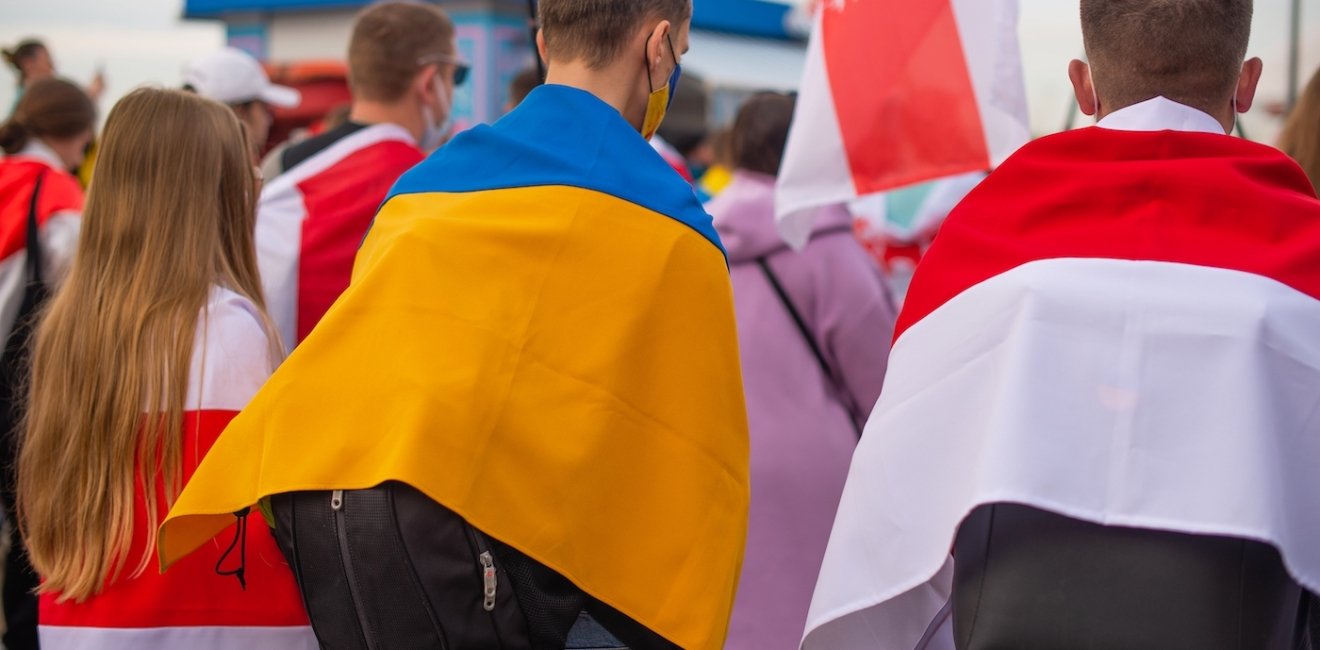
A blog of the Kennan Institute
The onset of Russia’s large-scale invasion of Ukraine and Belarus’s subsequent activities on the fringes in support of Russian troops have profoundly altered relations between Ukraine and Belarus. This turn of events has affected not only the political dynamic but also societal perceptions, creating a big gap between the two nations. But even in such conditions, the experiences of interactions before the war prevent Ukrainians and Belarusians from indulging in hatred of the other and could prove an important cornerstone for reconciliation in the future.
Friendship before the War
Traditionally, Ukrainians and Belarusians tended to view each other favorably, which fostered robust cross-border cooperation and regular cultural exchanges. It was not uncommon for Ukrainians to travel to Belarus to buy groceries or petroleum products, which were considered cheaper and of better quality, while Belarusians might choose Ukrainian cities as tourist destinations. As a result, in 2019, before the introduction of restrictions caused by the COVID-19 pandemic, the total number of border crossings amounted to more than 3 million.
Despite the gradual worsening of bilateral political relations following the crackdown on mass protests in Belarus in 2020, relations between the societies did not undergo drastic changes, remaining at relatively the same level. In 2021, 67 percent of Ukrainians had a positive attitude toward Belarusians compared to 73 percent in 2018, when more than 85.3 percent of Belarusians had a favorable attitude toward Ukrainian citizens.
Differentiating Society from Authorities
After February 2022, however, when the two countries found themselves almost on the brink of war with each other, a profound shift in mutual perception distanced Ukrainians from Belarusians as never before. According to research conducted by the Institute of Political Studies Political Sphere, 34 percent of Ukrainians have a positive perception of Belarusians, while 51 percenthave a negative perception.
Although the numbers have been almost the same over the past two years, there are indicators that Ukrainians are making efforts to differentiate Belarusiansociety, on the one hand, from the Lukashenko regime on the other. Thus, 87 percent of Ukrainians have a negative attitude toward the Belarusian state. Such a discrepancy in attitude toward Belarusians and toward the Belarusian state can be attributed to an association of the state with the incumbent Belarusian authorities and their close cooperation with the Russian Federation, whereas ordinary Belarusians are perceived by Ukrainians through the lens of personal relations and memories of positive experiences in previous engagements.
Similar trends are evident in Belarusian society. Despite the existence of an informational vacuum and an influx of Russian propaganda, the majority of Belarusians hold a positive view of the residents of Ukraine. However, their perception of Ukrainian authorities is notably less favorable.
The Past Shapes the Present
What is even more fascinating is that half of Belarusians advocate for improving relations with Ukraine. They commonly emphasize the need to establish mutually beneficial trade relations, enhance cooperation between border services, and foster diplomatic relations.
With respect to the Russo-Ukrainian War, Belarusians are mostly detached from events, and one-third express no sympathies for either side. Such a detachment from the war is partly linked to the strong negative emotions evoked by the parties to the conflict, with Belarusians experiencing sadness, wariness, fear, and anger. Moreover, Belarusians have close connections with both Ukrainians and Russians, which makes it difficult to side with either party.
Most important, Belarusians experience strong antiwar sentiments, with only 2 percent of those surveyed believing that Belarus should take part in the war on Russia’s side. This fact partially serves as a mechanism to deter Lukashenko: should Belarus become directly involved in Russia’s aggression, it would be more difficult for him to preserve internal stability and legitimacy in the eyes of at least part of the population.
Signs of Cooperation
Today, these individuals play a crucial role in reviving cooperation between Ukrainian society and Belarusian society. In 2022, members of the Belarusian diaspora in Poland, Lithuania, and Georgia almost unanimously supported Ukraine’s struggle, with many participating in rallies, expressing solidarity, and providing financial support.
More than two years after the beginning of Russia’s large-scale invasion, cooperation and mutual support have not faded away. Ukrainians and Belarusians participate in each other’s activities, establish joint businesses, and run humanitarian initiatives. Despite the relocation of many, the Belarusian diaspora in Ukraine is active in volunteering and providing support for the Ukrainian Armed Forces, while several hundred Belarusian citizens have been fighting on Ukraine’s side in various volunteer units, especially in the Kalinouski Regiment.
Hope for the Future
Belarus’s participation in Russia’s large-scale invasion of Ukraine has driven a wedge between Ukrainians and Belarusians, causing an unprecedented deterioration in relations between the two nations. But even under the different ideological and political systems existing in Belarus and Ukraine, each society’s perception of the other is still partly shaped by a partly shared history. This does not guarantee an immediate improvement in relations or a return to the status quo of 2021. However, past experiences coupled with new forms of people-to-people interaction set the stage for positive changes in the future.
The opinions expressed in this article are those solely of the author and do not reflect the views of the Kennan Institute
Author


Kennan Institute
The Kennan Institute is the premier US center for advanced research on Eurasia and the oldest and largest regional program at the Woodrow Wilson International Center for Scholars. The Kennan Institute is committed to improving American understanding of Russia, Ukraine, Central Asia, the South Caucasus, and the surrounding region through research and exchange. Read more

Explore More in Focus Ukraine
Browse Focus Ukraine
Talking to the Dead to Heal the Living

Ukrainian Issue in Polish Elections


